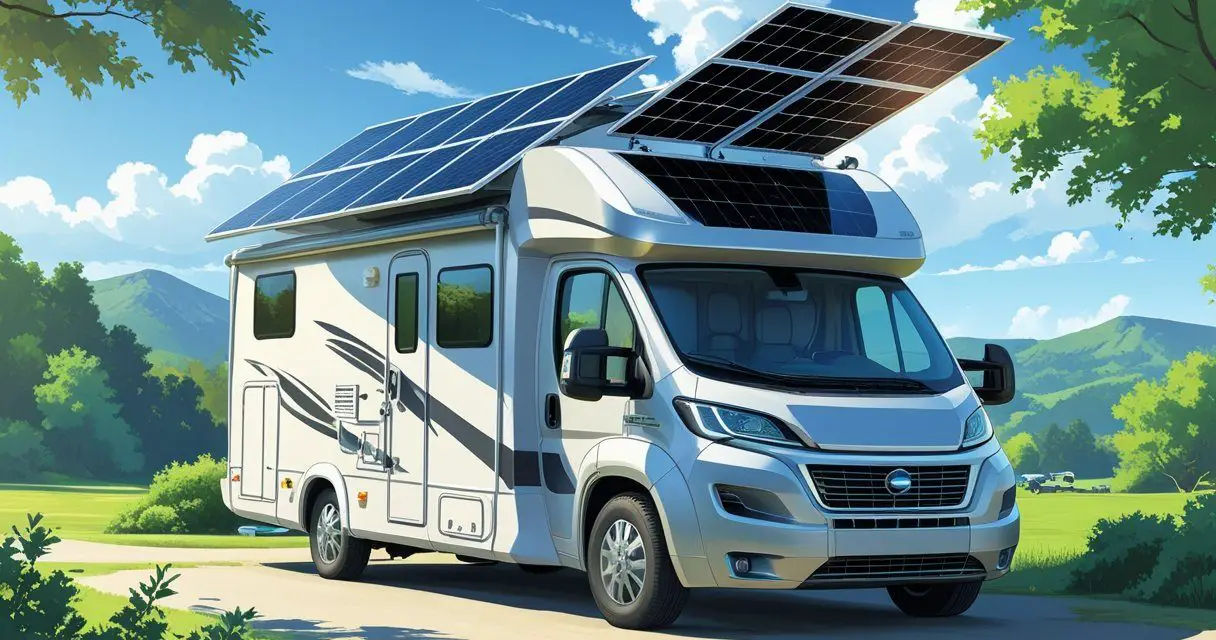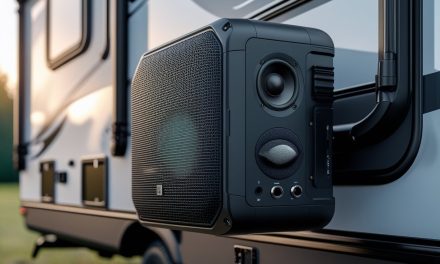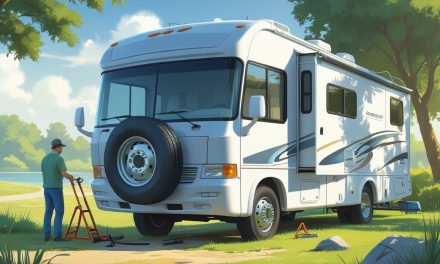The Ultimate Resource for RV Owners Who Want to Power Their Refrigerator with Solar Energy
Are you tired of worrying about propane costs or being tethered to electrical hookups just to keep your food cold during RV adventures? You’re not alone! Many RV owners are discovering that solar power can indeed run their RV fridge – and it’s easier than you might think.
Yes, your RV fridge can absolutely run on solar power! With the right setup, you can keep your food fresh and drinks cold for days without hookups or generators. The key is understanding how much power your fridge needs and matching it with the right solar system.
Let’s dive into everything you need to know about powering your RV fridge with solar energy.
Quick Answer: Yes, But Here’s What You Need to Know
Your RV refrigerator can run on solar power, but the specifics depend on several important factors:
- 12V compressor fridges are the most solar-friendly option
- You’ll typically need 100-200 watts of solar panels for most RV fridges
- Battery storage is essential – the fridge runs off batteries, not directly from panels
- Modern 12V fridges use 40-80 watts per hour and consume 320-640Wh daily
Types of RV Fridges: Which Work Best with Solar?
Understanding your fridge type is crucial for solar success. Not all RV refrigerators are created equal when it comes to solar compatibility.
12V Compressor Fridges (Best for Solar)
12V compressor refrigerators are the solar champion of RV fridges. Here’s why:
- High efficiency – Use 40-80 watts per hour
- Direct 12V operation – No inverter needed
- Consistent performance in all temperatures
- Quick cooling and excellent temperature control
These fridges work just like your home refrigerator but run directly on 12V power from your batteries.
Absorption (3-Way) Fridges
Traditional propane-electric fridges can run on solar, but they’re not ideal:
- High power consumption on electric mode (300+ watts)
- Need 120V AC power (requires inverter)
- Less efficient than compressor models
- Better suited for propane operation when off-grid
Residential Fridges
Some RVs come with standard home refrigerators:
- Very high power consumption (400-800 watts)
- Require large solar systems (800+ watts of panels)
- Need powerful inverters (2000+ watts)
- Most expensive solar option
How Much Solar Power Does Your RV Fridge Actually Need?
Let’s break down the real numbers you need to know:
Daily Power Consumption by Fridge Size
| Fridge Size | Power Draw | Daily Usage | Recommended Solar |
|---|---|---|---|
| 20-30 Quart | 40-50W | 320-400Wh | 100-120W panels |
| 40-50 Quart | 60-70W | 480-560Wh | 140-160W panels |
| 55-60 Quart | 75-80W | 600-640Wh | 180-200W panels |
Would you like to save this article?
Note: These numbers assume the fridge runs about 8 hours per day (33% duty cycle)
Simple Solar Calculation
Here’s an easy formula to calculate your solar needs:
Solar Panels Needed = (Daily Fridge Usage ÷ Daily Sun Hours) ÷ 0.8
The 0.8 accounts for system efficiency losses
Example:
- Fridge uses 480Wh daily
- You get 5 hours of good sun
- (480 ÷ 5) ÷ 0.8 = 120 watts of solar panels needed
Real-World Solar Setup Examples
Budget Setup ($500-800)
- 100W solar panel
- 100Ah lithium battery
- 30A charge controller
- Good for: Small 12V fridges, weekend trips
Mid-Range Setup ($1,200-1,800)
- 200W solar panels
- 200Ah lithium battery
- 40A MPPT charge controller
- Good for: Medium fridges, week-long trips
Premium Setup ($2,500-4,000)
- 400W+ solar panels
- 400Ah+ lithium batteries
- 60A+ MPPT charge controller
- Good for: Large fridges, full-time living
Essential Components for Your Solar-Powered Fridge System
1. Solar Panels
Monocrystalline panels are your best bet for RV use:
- More efficient in limited roof space
- Better performance in partial shade
- Longer lifespan than polycrystalline
2. Batteries (The Real MVP)
Lithium batteries are worth the investment:
- Lighter weight than lead-acid
- Deeper discharge capabilities (up to 95%)
- Faster charging from solar
- Longer lifespan (10+ years vs 3-5 years)
3. Charge Controller
Always choose MPPT over PWM:
- 30% more efficient energy harvesting
- Better battery charging profiles
- Remote monitoring capabilities
4. Inverter (If Needed)
For AC fridges, you’ll need a pure sine wave inverter:
- 2000W minimum for residential fridges
- Pure sine wave prevents appliance damage
- Low idle consumption to save battery power
Step-by-Step Installation Guide
Planning Phase
- Measure your fridge’s power consumption with a Kill-A-Watt meter
- Calculate daily usage based on your camping style
- Size your system using the formulas above
- Check roof space for panel placement
Installation Steps
- Mount solar panels on roof with proper tilt
- Install charge controller in accessible location
- Wire batteries with proper fusing and disconnects
- Connect fridge directly to 12V system
- Test system before your first trip
Always consult a professional electrician for complex installations
Money-Saving Tips and Tricks
Maximize Efficiency
- Pre-cool your fridge before leaving home
- Keep it full – thermal mass helps maintain temperature
- Use frozen water bottles as additional cooling
- Park in shade when possible to reduce fridge workload
Budget-Friendly Options
- Start small and expand your system over time
- Buy used panels from solar installers
- DIY installation can save 50% on labor costs
- Consider portable panels for flexibility
Common Mistakes to Avoid
Undersizing Your System
Don’t go too small! It’s better to have extra capacity than run out of power. A common mistake is calculating based on perfect conditions – real-world performance is always lower.
Skipping Battery Storage
Your fridge doesn’t run directly on solar – it runs on battery power. Solar panels charge the batteries, batteries power the fridge. You need adequate battery capacity for nighttime and cloudy days.
Using the Wrong Fridge Type
Absorption fridges on electric mode are power hogs. If you’re planning to rely on solar, invest in a 12V compressor fridge instead.
Seasonal Considerations
Summer Challenges
- Higher fridge usage due to heat
- More available sunlight for charging
- Park in shade to reduce fridge workload
- Consider additional panels for peak usage
Winter Considerations
- Less sunlight available for charging
- Better battery performance in cool weather
- Snow removal from panels essential
- Angle panels for low winter sun
Troubleshooting Common Issues
Fridge Running Too Much
Possible causes:
- Door seals worn out
- Overpacked or underpacked fridge
- Poor ventilation around coils
- Thermostat set too low
Batteries Draining Quickly
Check these factors:
- Battery age and condition
- Parasitic loads from other devices
- Charge controller programming
- Panel shading or dirt buildup
Insufficient Solar Charging
Solutions:
- Clean panels regularly
- Check for shading issues
- Verify wire connections
- Consider panel angle adjustment
Video Resources
This helpful video shows exactly how to set up solar power for a 12V fridge, including all the components you’ll need.
Watch this real-world power consumption test to see exactly how much power a 12V RV fridge actually uses over 24 hours.
Future-Proofing Your Solar Setup
Expandability
Design your system to grow:
- Use larger charge controllers than currently needed
- Leave space for additional panels
- Size wiring for future expansion
- Choose modular battery systems
Technology Upgrades
Keep an eye on:
- More efficient solar panels (coming soon: 25%+ efficiency)
- Better battery chemistry (solid-state batteries)
- Smart charge controllers with AI optimization
- Integrated monitoring systems
Frequently Asked Questions
Can a 100-watt solar panel run an RV fridge?
Yes, but only small 12V fridges. A 100W panel can support a 20-30 quart compressor fridge with adequate battery storage. Larger fridges need more solar capacity.
How long will my fridge run on batteries alone?
Depends on battery capacity and fridge size. A 100Ah lithium battery can typically run a medium 12V fridge for 24-36 hours without solar input.
Do I need an inverter for a 12V fridge?
No! That’s the beauty of 12V compressor fridges – they run directly on battery power without needing an inverter, making them much more efficient.
What happens during cloudy days?
Your batteries take over. This is why adequate battery capacity is crucial. Most systems are designed to handle 2-3 cloudy days without issues.
Can I run other appliances with my solar fridge system?
Absolutely! Size your system accordingly. LED lights, fans, and phone chargers add minimal load. Larger appliances like microwaves need significant additional capacity.
Cost Breakdown: What to Expect
Initial Investment
- Basic system: $500-800
- Mid-range system: $1,200-1,800
- Premium system: $2,500-4,000+
Long-term Savings
- No propane costs for refrigeration
- No campground fees for electric hookups
- Extended boondocking capabilities
- Increased RV resale value
Break-even Analysis
Most RV owners break even in 2-3 years through saved campground fees and propane costs, especially if they enjoy boondocking frequently.
Conclusion: Your Solar-Powered Freedom Awaits
Running your RV fridge on solar power is not only possible – it’s practical, economical, and liberating! With the right setup, you can enjoy unlimited boondocking while keeping your food fresh and drinks cold.
Key takeaways:
- 12V compressor fridges work best with solar
- 200W of solar handles most RV fridges comfortably
- Lithium batteries are worth the investment
- Proper sizing prevents frustration and system failure
The technology has never been better or more affordable. Solar-powered refrigeration opens up incredible camping opportunities and pays for itself through reduced campground fees and propane costs.
Ready to make the switch? Start by measuring your current fridge’s power consumption, then size your solar system accordingly. Your future self will thank you when you’re enjoying a cold drink while watching a sunset from your favorite off-grid campsite!
Sources:
- Stressless Camping – RV Fridge on Solar
- RV Lifestyle Experts – Ultimate Guide to Best RV Fridge for Solar Power
- BougeRV – What Size Solar Panel Do I Need to Run a 12V Fridge
- ShopSolar.com – Can A 200 Watt Solar Panel Run A Refrigerator
- 4WD Supacentre – Solar Panels & Camping Fridges
- EcoFlow – How Many Solar Panels to Power a Refrigerator







